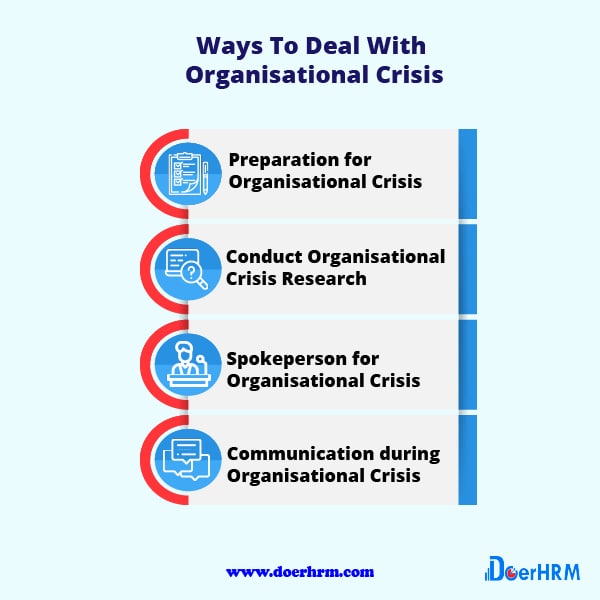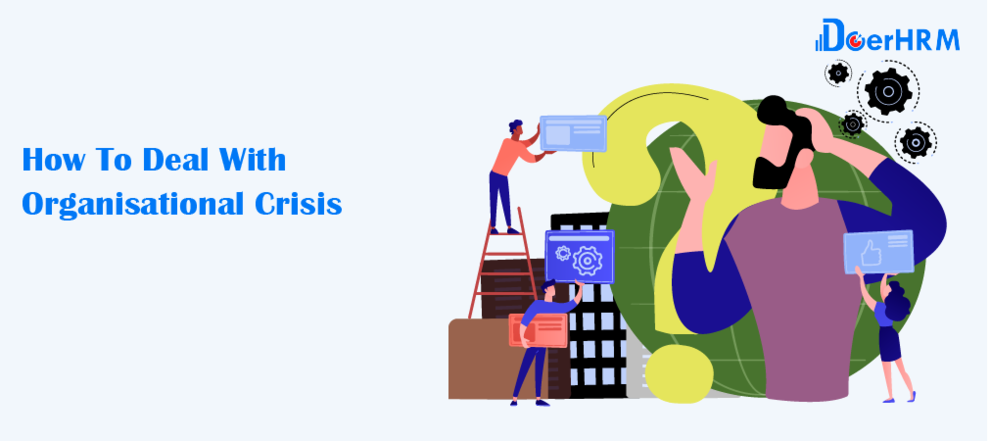The scariest circumstance which many entrepreneurs might face is organisational crisis. Organisational crisis can be caused by a loss of an important client, a succession of resignations or others which are classified as internal problems. Besides, it can also be caused by external problems such as economic crises, natural disasters and others. All these organisational crisis might bring financial ruin to the company. Thus, it is absolutely necessary to react quickly and take proper measures to get your business out of the turmoil. Here are some ways to deal with organisational crisis.

1. Preparation for Organisational Crisis
To ensure the organisation can survive in any uncertain situations, prior preparation is what you must have. As a leader, it is essential for you to ensure that you have set up several ways to reduce the effects of organisational crisis once it happens. For example, setting up a crisis management department which is a team that is composed of experts in the field of crisis management and prevention is taken in advance for some of the organisation. It has become a safeguard that prevents the organisation from failing once an organisational crisis has happened. Hence, setting up some methods to fight against these organisational crisis in advance might have saved you from all the risks of losing all. In addition, you should have tailored all these prepared ways or plans for your organisation. In order to ensure the prepared ways or plans can be utilised effectively, it has to be tested so that you can make sure your ways or plans can be carried out in a real-life situation but not just in theory.
2. Conduct Organisational Crisis Research
As a leader, you must be characterised by constant training. There is always something new in your field for you to learn every single day. To make it become possible, conducting research will be a way that helps you manage to stay on top. This is because of research discoveries and inventions concerning your industry which can help you to not be left out when there are any significant changes in the industry. This means that you can keep updated and are able to know what, when and where to act. Moreover, it is essential for you to have a post-crisis analysis. You should examine how effective your plans were during the organisational crisis and the impact of the incident. Post-crisis analysis can help you and your teams to know what was done well and what could be done better next time. Post-crisis analysis can also help you to know how many different kinds of elements of your ways or plans that you should improve on.
3. Spokeperson for Organisational Crisis
A spokesperson is the person who coordinates corporate communications carefully to preserve your company’s image and reputation in times of crisis. It is essential for you to designate and train a spokesperson as the spokesperson is also to show the situation of your company is under control. When you are in a crisis situation, there are two main types of communication. The first type of communication is the communication which makes it possible to manage the crisis and reduce the impact on business operations. Then, the second type of communication would be the communication aimed at avoiding scandals and protecting the reputation of the company. To sum up, you must select your official spokespeople carefully and provide them training to speak via different kinds of communication channels. This is because an official spokesperson is the authorised party to speak on the company’s behalf in the event of a crisis. The most important is the official spokesperson will be seen as an official source of information about your company position and actions.
4. Communication during Organisational Crisis
In times of crisis, effective communication will be really important to help your company to overcome the organisational crisis. First of all, in order to have effective communication, the information needs to flow through departments in the required format. Employees need to know what is going on around them. Individuals need easy access to the manager’s room to discuss important issues and solicit their suggestions. Managers should deal with employees in crisis situations in open forums. Furthermore, another thing which is also significant during the crisis is discussions. You may sit down with your employee and discuss the problems among yourselves to come up with mutually agreed upon and the most effective solutions in times of crisis. Additionally, you should try to avoid some unnecessary conflicts and misunderstandings in your company as these may worsen the situation during the organisational crisis.
Conclusion
Above are the ways to deal with organisational crisis. You have to know that a crisis is a real test for your company. Nevertheless, you can strengthen the image and reputation of your company by your effective crisis management.






